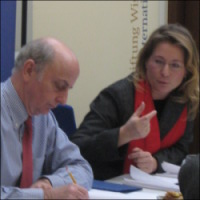Registration
You will receive an email confirming your registration.
IMGXYZ1063IMGZYXAs demonstrated by the recent crisis in Gaza, the situation in the Middle East is not only unstable, but within the region there is a potential for the violent escalation of conflict. It would be in the interests of both the European Union (EU) and the Middle East if the EU played a more active and strategic role in conflict management and resolution in the region.
Dr. Muriel Asseburg, head of the Middle East and Africa division at the Stiftung Wissenschaft und Politik (SWP), Berlin, spoke about how Europe can be more effective in the Middle East, presenting a paper to be published shortly by the Carnegie Endowment and the SWP, European Approaches to Conflict Management and Conflict Resolution in Lebanon, Syria and the Palestinian Territories: Challenges and Opportunities.
Christian Jouret, Head of the Mediterranean/Barcelona and Middle East Task Force at the General Secretariat of the Council of the European Union, responded.
European efforts at conflict management and resolution in the Middle East
Asseburg argued that the EU has pursued three main aims in its Middle East policies. Firstly, it has contributed to a two-state solution to the Israeli Palestinian conflict (including support for socio-economic development and for the establishment of Palestinian governing institutions). Secondly, it has engaged in the multilateral dimension of the Middle East Peace Process, supporting comprehensive peace between Israel and its neighbors. Finally, it has aimed to contribute to the creation of an enabling environment for peace and deflecting ‘soft’ security risks (terrorism, illegal migration and organized crime) emanating from the region in the framework of the Euro-Mediterranean Partnership, the European Neighborhood Policy and the Union for the Mediterranean.
Christian Jouret commented that one of the fundamental questions for EU foreign policy is ‘can we bite?’ The world is changing quickly – thus, international actors need to be able to respond quickly. He stressed that EU foreign policy has evolved at pace over the last few years. However, the necessity to reach consensus on every issue and the multiplicity of European actors make it difficult to clearly define common interests. When the EU member states are able to define common interests, they have difficulties in defending them. As such, the EU tends to concentrate on structures, principles and processes. However, Europe is moving in the right direction. New structures, instruments and capabilities have been created. This has been translated into a whole range of crisis management operations on the ground.
The EU has been reluctant to shepherd negotiations on final status issues, explained Muriel Asseburg, leaving the task largely to the U.S.. However, in recent years, Europeans have become more active with regards to conflict management. Asseburg highlighted the European Security and Defense Policy (ESDP) missions in the Palestinian territories, a German-led pilot project on border control in Northern Lebanon, and involvement in the security sector in the Palestinian territories and Lebanon. These efforts, however, have largely been crisis driven and reactive rather than strategic and comprehensive. Europeans have also made attempts at conflict resolution, particularly in the multilateral context of the Middle East Quartet (EU, UN, Russian Federation, and the U.S.).
Jouret stressed that the EU now has a clearer picture of what can be achieved with ESDP operations. ESDP missions have three major objectives: to support a peace process, to react to crises, and to engage in nation-building. The ambition of the EU is to cover the whole spectrum of activities related to crisis management, from conflict prevention to peace-making, peace-keeping, post-conflict reconstruction and development.
Engagement with Hamas and Palestinian Unity
Jouret explained that because Hamas was already on the EU list of terrorist organizations prior to the 2006 Palestinian election, the EU was put in a difficult position by the election victory. The EU is unable to financially support or to otherwise engage with Hamas. This has resulted in pressure being applied on to the people in Gaza rather than on the organization, an approach which Asseburg described as counterproductive. She argued that a renewed power sharing agreement is a precondition for European efforts in reviving the Palestinian economy, stabilizing the security situation and giving the backing needed to the Palestinian President to pursue political negotiations.
Israel-Syria
Asseburg observed that although the French led European re-engagement of Syria has reduced Damascus’ international isolation, continued U.S. isolation will prevent progress on the Israeli-Syrian track. Europeans should assume a supportive role in moving talks between Syria and Israel forward, but will not be able to act as a substitute for the U.S. in providing security guarantees. Europeans should adopt a common position for a gradual building of closer cooperation with Syria conditioned on tangible progress in Syrian-Lebanese relations.
Recommendations for the EU
Asseburg suggested that the main priorities for EU engagement in the Middle East should be to put forward a concrete plan for sustaining peace talks until the next U.S. administration is fully established and for then moving from crisis management to crisis solution. This would include a much stronger external mediation and chaperonage of the Israeli-Palestinian negotiations as well as supporting power sharing between Palestinian factions and creating an environment in which sustained economic development is possible. This would necessitate a need for more effective cooperation with the incoming U.S. administration, as well as between EU member states.
